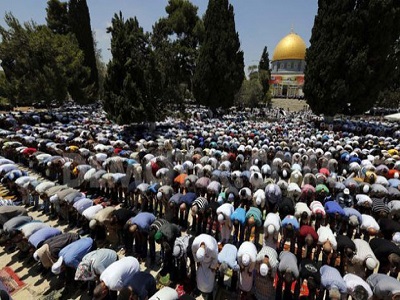
By Rima Najjar
As usual, commentary on the latest stand-off between Israel’s forces and Palestinian Muslims due to the closure of Al-Aqsa Mosque Compound to Friday prayers on July 21, 2017 was confusing.
One commentary goes like this: Yes, these are Muslims being killed, gassed and pushed around, but the “clashes” are not really about the encroachment on Al-Aqsa by the so-called Temple movement – a messianic Jewish extremist movement supported by the Israeli government that aims to replace Al-Aqsa with a Jewish temple; that’s just a pretext, a provocation designed to allow Israel to perfect its Jewish nationalist goals in Jerusalem or to cloak colonialism.
Yes, Israel has been vigorously judaizing illegally annexed and occupied East Jerusalem, but the thousands of devout Jews colonizing the city have nothing to do with Judaism – they are there simply as a front for the settler colonial state – and a provocation to push Palestinian Arabs out, who just happen to be mostly Muslim.
Well, it looks like Muslims in Palestine on either side of the Green Line, not to mention in the Gaza enclave, believe deeply Israel is all about Judaism – as much or even more so than about nationalism – especially in Al-Quds (Jerusalem).
Since Palestinians on the street are praying, speaking and shouting in Arabic, much of what they are saying goes over the heads of the non-Arabic speaking TV viewer, and that includes the majority of Israeli Jews.
The following is a translation of a speech, captured on video and posted on Facebook. The setting is Salah-al-Din Street close to one of the gates of the Old City (Bab Al-Amoud). The speaker is addressing a crowd of worshipers who had been prevented by Israeli police from accessing Al-Aqsa Mosque for Friday prayer.
“These crowds standing here are sending one message to the whole world that Al-Quds is Arabic, Islamic and Palestinian, a city that raises the heads of al umma up high everywhere – this is how Al-Quds was; this is how Al-Aqsa was and so it will be.
“We repeat, these crowds of people come here to pray and nobody can put a stop to them or the freedom of worship. The majority of Muslims in this homeland are unable to reach Al-Aqsa Mosque. That’s why the occupation is responsible. We refuse the gates because they are coming from the occupation; if they place roses in Al-Aqsa, we will refuse it because it is coming from the occupation … we are for life, not death, but a life with dignity. Life needs a stand for dignity and as we said in the past and say and repeat now Al-Aqsa Mosque is a place of worship for Muslims period.
“During the time of the Crusades and foreign invasions the gates of the Al-Aqsa Mosque were closed for 90 years. The foreigners left and Al-Aqsa Mosque remained and that is what must be. Be certain that the stand you are taking now is one that has moved the world – the stand of the youth with whom we stood in solidarity all week is what has moved the world and that is what will impose justice and truth that Al-Aqsa is for Muslims. Your chanting here that Al-Aqsa Mosque is sorrowful. You are here to make a stand for the dignity and authenticity of Al-Aqsa whether they like it or not. Say it along with me – Al-Aqsa Mosque is a place of worship for Muslims. May the blessing and mercy of God be upon you.”
The attitude reflected by Jewish youth who have been parading through the Old City on Jerusalem Day since May 12, 1968, shouting racist chants against Arabs (a euphemism for Muslim), has much to do with Judaism and the role that the city plays in its ancient traditions.
Unfortunately for the Zionist project, it is Palestinian Arabs – Jews, Christians and Muslims – who are the true heirs of that tradition and not immigrant or colonizing Jews. The Palestinian speaker above claims the heritage of Al-Aqsa for all the Muslim “Umma”, but he understands it as a spiritual heritage, not as a nationalist one. It’s the same for Christians worldwide; the Holy Land has not been turned into a real-estate bargain for Christians worldwide despite their historic connection to the land. But by claiming Palestine for all Jews worldwide, Zionist nationalism as a “homeland for Jews” does not make any distinctions.
In The Zionist Idea: A Historical Analysis and Reader, Arthur Hertzberg writes:
“Zionism cannot be typed, and therefore easily explained, as a ‘normal’ kind of national . To mention only one important difference, all of the other 19th-century nationalisms based their struggle for political sovereignty on an already existing national land or language (generally there were both). Zionism alone chose to acquire both of these usual conditions of national identity by the elan of its nationalist will. It is therefore a maverick in the history of modern nationalism, and it simplifies the task of general historians to regard it, at least by implication, as belonging only on the more parochial stage of the inner history of the Jewish community.”
The “right” to establish Israel in Palestine is predicated on the powerful mythical idea of Palestine as the religious homeland of the Jews and both secular Zionists as well as religious Zionists are wedded to this notion. It is a mistake to believe that the religious war brewing now in Palestine is not part and parcel of the Zionist project in a fundamental way, and not simply as a political strategy.
– Rima Najjar is a Palestinian whose father’s side of the family comes from the forcibly depopulated village of Lifta on the western outskirts of Jerusalem. She is an activist, researcher and retired professor of English literature, Al-Quds University, occupied West Bank.




